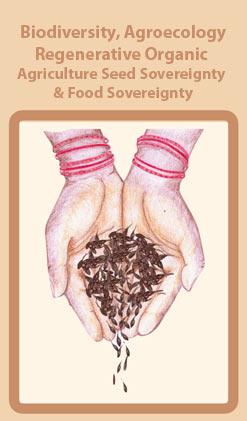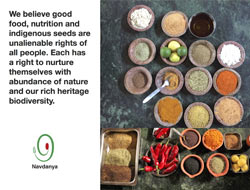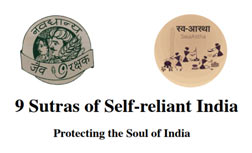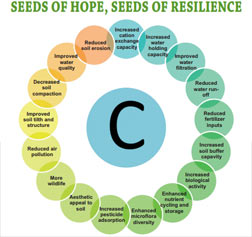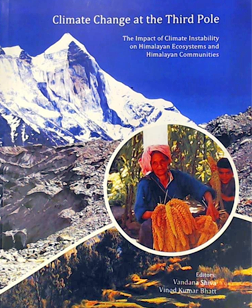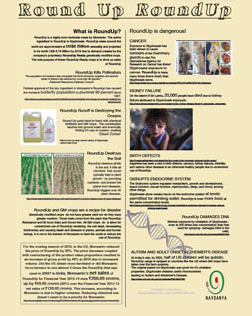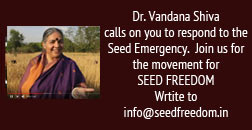Bitter Seeds
Film Festival Reviews
By Peter Debruge
http://www.variety.com/review/VE1117945978/

(A Teddy Bear Films and Independent Television Service (ITVS) production with funding from Corp. for Public Broadcasting. Executive producer, Sally Jo Fifer. Produced, directed, written by Micha X. Peled. With: Manjusha Amberwar, Ram Krishna Kopulnar, Vinayah Shaghai, Gyanandra Shukla, Madhau Shande, Kishor Tiwani, Vandana Shiva. (Hindi, English dialogue)
Rounding out his "Globalization Trilogy" with another affecting, character-driven portrait designed to indict corporate opportunism, Micha X. Peled exposes the issues underlying a rash of farmer suicides in "Bitter Seeds." Focusing on a small agrarian community in central India -- a country where a quarter million farmers have taken own their lives in the last 16 years -- Peled follows a hopeful young woman, Manjusha Amberwar, studying to be a journalist so she can help put a stop to the trend that claimed her father and now threatens her uncle. His emotional, gripping doc should sprout awareness in public-broadcasting and educational quarters.
Like a mellower, more narratively inclined version of activist helmer Robert Greenwald, Peled has previously taken on Wal-Mart ("Store Wars") and overseas sweatshops ("China Blue") by profiling the people most affected by mega-companies' profit-driven agendas. In "Bitter Seeds," he implicates U.S.-based biotech monolith Monsanto (makers of DDT and Agent Orange, per one of the pic's slides) in the Indian farmers' deaths, but does so through a story compelling enough to support a scripted drama.
Using Amberwar as his guide, to the extent that her amateur investigation becomes the film's primary focus, Peled puts a face on the victims of the industrial agriculture chain -- the independent farmers with no more than a few acres to their name, such as Amberwar's uncle, Ram Krishna Kopulnar.
Interviewing an older relative, Amberwar learns that conventional seeds have been phased out in her lifetime. Whereas past generations kept expenses to a minimum, using cow dung to fertilize their fields and saving seeds from year to year, today farmers buy genetically modified, non-renewable seeds in order to produce higher yields of pest-resistant crops. However, because these special seeds are sterile by design, farms must renew their supply each year in addition to buying expensive fertilizers and insecticides to protect the water-hungry plants.
Economically strapped farmers must take loans from the local banks -- or, in many cases, turn to high-interest private lenders -- putting up their land as collateral just to finance their annual cotton planting. If fate is unkind and drought or infestation strikes, it can spell ruin. Even in good years, this arrangement leaves little or no money for other expenses, including dowries that might boost daughters to a slightly better social standing. When things go wrong, many farmers drink pesticide in a symbolic gesture that points back to the root of their woes.
As a father with two girls, Kopulnar has it especially tough, and even though he never speaks of suicide, the look in his eyes suggests that can't be far from his mind. His eldest daughter Sawpna is just starting to entertain marriage offers, which raises the stakes for this year's crop, adding yet another character to the intimate family drama at the film's center.
The crisis depicted in "Bitter Seeds" is all the more dire when you consider that half the world's population are farmers. Peled could have turned his cameras virtually anywhere to find similar tragedy, from South America to the U.S. (where subsidies disproportionately benefit agribusiness giants and undercut foreign competitors) to any place that industrial agriculture has driven out the little guys.
One reason the tiny Indian community of Telung Takli makes sense is Amberwar -- a compelling central character whose personal story raises additional issues about gender, class and non-farming employment opportunities. No female from her village has ever pursued journalism as a career, and this subplot offers an encouraging case for education as one solution to the cycle (certainly more win-win than driving out Monsanto).
But her investigation has its limits, and Peled pushes the inquiry a giant stride further by interviewing scientists, activists and spokespeople for various seed companies. Tech credits are slick enough to support bigscreen play, especially gorgeous HD lensing by d.p. Devendra Golatkar that makes the Third World look first-class.
Camera (color, HD), Devendra Golatkar; editor, Leonard Feinstein; music, Frank Illman; sound, Kaamod Kharade; associate producer, Prachi Bari; assistant director, Shyam Dharmadhikari. Reviewed at Telluride Film Festival, Sept. 3, 2011. Running time: 88 MIN.


